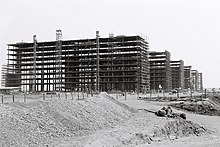Fourth Brazilian Republic
This period was marked by often tumultuous presidencies of Eurico Gaspar Dutra, Getúlio Vargas, Café Filho, Juscelino Kubitschek, Jânio Quadros and João Goulart.
As the Second World War ended with Brazil participating on the Allied side, then president Getúlio Vargas moved to liberalize his own fascist-influenced Estado Novo regime.
The Estado Novo ended when two of his most rightist supporters, the Minister of War Eurico Gaspar Dutra, and Army Chief-of-Staff Pedro Aurélio de Góis Monteiro led a military coup on 29 October 1945.
In 1947, he appointed Osvaldo Aranha as representative of Brazil to the United Nations, outlawed the Brazilian Communist Party, ended diplomatic relations with the Soviet Union and organized the Inter-American Conference of Peacekeeping and Security of the Continent in Petrópolis, which was attended by U.S. president Harry Truman.
Proposed in 1947, the plan aimed at better management of public spending and investment in key sectors in the country but only began to receive funding from the budget in 1949, being forgotten in 1951.
The murder of major Rubens Vaz, an associate of opposition newspaper editor Carlos Lacerda, by some of the president's bodyguards, known as the crime of "Rua Tonelero", led to a reaction against Vargas.
The results were immediate: opposition newspapers were closed, the people took to the streets and in a last shown of political force and popularity, Vargas postponed the military dictatorship by 10 years.
Vargas' ever-shifting populist dictatorship helped to rein in the agrarian oligarchs, paving the way for the democratization of the 1950s and 1960s which was ended by the right-wing 1964 military coup.
In contrast, under the presidency of João Goulart (1961–64) — a protégé of Getúlio Vargas and another gaúcho from Rio Grande do Sul, the closeness of the government to the historically disenfranchised working class and peasantry and even to the Communist Party led by Luís Carlos Prestes was remarkable.
Eventually, the 1964 junta and the ensuing military dictatorship proved that the establishment forces that ushered Goulart's mentor into power in the first place, and the bourgeoisie that Vargas helped rear found the left-leaning turn of Brazilian populism intolerable.
This plan sought to stimulate the diversification and expansion of the Brazilian economy, based on industrial growth and closer integration of the country's territory.
Kubitschek sought to achieve this progress with the aid of foreign investment, which in turn would be given generous incentives, such as profit remittances, low taxes, privileges for the importation of machinery, and land donations.
When Quadros took office, on 31 January 1961, it was the first time since Brazil became a republic in 1889 that an incumbent government peacefully transferred power to an elected member of the opposition.
As president, Quadros outlawed gambling, banned women from wearing bikinis on the beach, and established relations with the Soviet Union and Cuba, trying to achieve a neutralist international policy.
The re-establishment of relations with the Socialist Bloc in the middle of the Cold War cost him the support of the UDN in Congress, so he was left with no real power.
His resignation is commonly thought to have been a move to increase his own power, as he expected to return to the presidency by the acclamation of the Brazilian people or by the request of the National Congress of Brazil and the military.
The crisis was solved by the "parliamentarian solution" – an arrangement that decreased his powers as president by creating a new post of Prime Minister, which was filled by Tancredo Neves, and instituting a Parliamentary republic.



